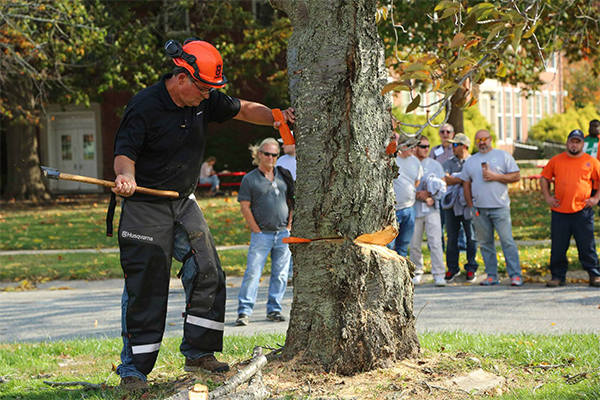Sunday hunting is prohibited on all State Forest property More Info
Trees are a valuable part of our natural infrastructure. Tree work should only be done by those properly insured, trained, and equipped to work safely in trees.
Find an ISA-certified arborist

American Society of Consulting Arborists
International Society of Arboriculture (ISA)
Delaware Nursery and Landscape Association
Society of Municipal Arborists
Tree Care Industry Association
USDA Urban and Community Forestry Program
International Society of Arboriculture (ISA) Credential Programs
TCIA Best Practices and Safety Programs – Training Calendar
Integrated Pest Management (IPM) is a science-based process that combines tools and strategies to identify and manage pests. Pests are any organisms (including plants and animals) that pose health, environmental, economic, or aesthetic risks. IPM provides economic, health, and environmental benefits. IPM practitioners use knowledge of pest and host biology along with monitoring to implement management tactics to 1) prevent unacceptable levels of pest damage; 2) minimize the risk to people, property, infrastructure, natural resources, and the environment; and 3) reduce the evolution of pest resistance to pesticides and other pest management practices.
University of Maryland IPM Alerts – Landscape and Nursery
Delaware Invasive Species Council (DISC) is a non-regulatory organization of nearly 100 scientists, botanists, and ecologists with government, academia, and nonprofit organizations. Its mission is to protect Delaware’s ecosystems by preventing the introduction and reducing the impact of non-native species.
Delaware Native Species Commission was formed by the Delaware General Assembly to implement recommendations made in the final report of the Statewide Ecological Extinction Task Force. Its mission is to: 1) reverse the trend of decline and extinction of Delaware’s local plant and animal native species; 2) work to implement the recommendations of the Statewide Ecological Extinction Task Force; and 3) provide expertise and assistance to state and local lawmakers, policy makers, educators, and other stakeholders.
Delaware Department of Agriculture’s (DDA) Plant Industries Section aims to prevent the introduction, establishment, or spread of plant and honeybee pests, and suppress, control, abate, or eradicate pests that are dangerously injurious to the agricultural, horticultural, and forestry interests of the state.
Delaware Invasive Plants Law (Effective July 1, 2022)
Grant and Funding Opportunities
Introduction to UTC Assessments VIDEO
EPA’s National Stormwater Calculator
Urban Forest Management Plan (UFMP) Toolkit
Urban Forestry Best Management Practices for Public Works Managers
Conducting a Tree Inventory (Cornell University)
Urban Tree Canopy Assessment (U.S. Forest Service)
Tree Equity Score (American Forests)
Ordinances – Overview (New York State)
Sample Tree Ordinance (Arbor Day Foundation)
Urban Nature for Health and Wellbeing (U.S. Forest Service)
Guide to Successful Pruning of Deciduous Trees – Calendar
Guide to Preserving Trees During Development (Penn State Extension) (PDF)
Virginia Tech Dendrology
Arbor Day Foundation Tree Identification
Cornell University Woody Plants Database
The Delaware Forest Service’s Urban and Community Forestry Program has compiled extensive maps that detail the tree canopy for each of Delaware’s 57 communities. Click on the links below to view and download the map for each community.
If you have questions, comments, or need assistance, please contact:
Urban and Community Forestry Program Send E-mail.